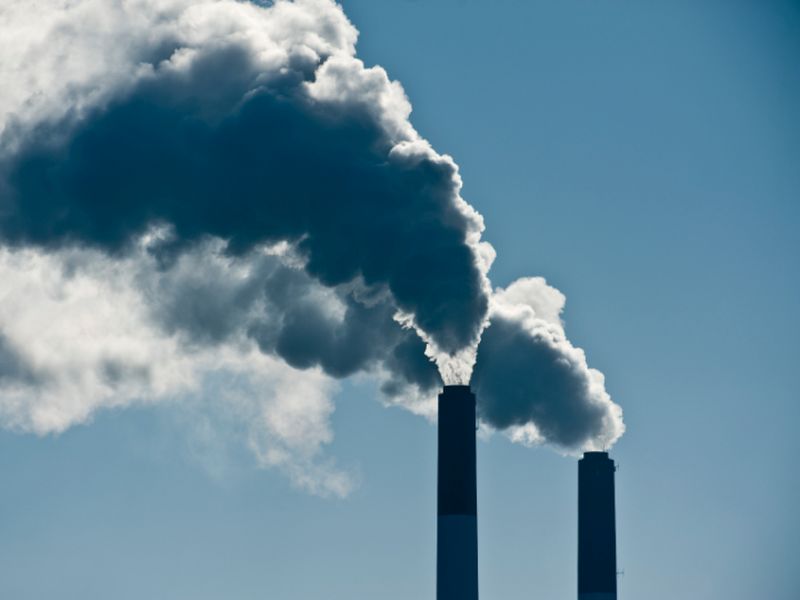Living in a more polluted area of the United States may be as damaging to your lungs as a pack-a-day cigarette habit, according to a new long-term study.
Ozone air pollution -- the type that's increasing due to climate change - leads to more emphysema-like changes in the lungs than other forms of air pollution, the study found.
Study author Dr. Joel Kaufman from the University of Washington in Seattle said it didn't take enormous changes in air pollution levels to see lung damage on CT scans.
"These were not big differences in ozone air pollution that started to affect the lungs. These are the kind of changes that people in the United States encounter. This isn't moving from the United States to India; it's the type of change in pollution from moving from the suburbs to the city," Kaufman said.
"One of the take-homes from this study is that although we've made tremendous progress in clean air, we can do more, and we shouldn't be reducing the focus on clean air. Plus, the same things we do to slow climate change can improve the air and our health now," he added.
Emphysema is a chronic lung disease commonly associated with smoking. But it's increasingly being diagnosed in people who never smoked, Kaufman said. Emphysema is a type of chronic obstructive pulmonary disease (COPD).
Ozone air pollution is found near ground level and is caused by emissions from cars, power plants, large boilers, chemical plants and refineries. Ozone air pollution is different from the naturally occurring ozone that protects Earth's upper atmosphere, according to the U.S. Environmental Protection Agency.
More than 7,000 adults from six urban areas - Baltimore; Chicago; Los Angeles; New York City; St. Paul, Minn., and Winston-Salem, N.C. - took part in the study. Volunteers were between 45 and 84 years old when the study began in the early 2000s.
Researchers followed them for a median 10 years, meaning half were tracked for less time, half more. Some had as long as 18 years of follow-up.
During the study, most had multiple CT scans to see how their lung health changed over time. Nearly 3,000 volunteers also had repeated lung function tests.
Researchers looked at measures of four major pollutants, including ground-level ozone, fine particulate matter, nitrogen oxide and black carbon. Levels of particulate matter and nitrogen oxide in the environment decreased over the period.
Ozone levels appeared to have the greatest impact on lung health. During the study, annual averages of ozone pollution in the six cities ranged from around 10 to 25 parts per billion, the researchers said.
A increase in ozone air pollution of 3 parts per billion over 10 years was associated with an increase in emphysema-like changes roughly equivalent to smoking a pack of cigarettes a day for 29 years, researchers noted.
Higher ozone levels were also linked to a greater decline on lung function tests.
"This study strongly supports that exposures to ozone air pollution and oxides of nitrogen are contributing to chronic lower respiratory lung disease (CLD) in the United States and globally," Kaufman said.
CLD includes asthma and other types of COPD, such as chronic bronchitis.
He said the findings are supported by animal studies, which have shown that exposure to ozone air pollution leads to lung damage.
Kaufman said there's not much people can do on their own to protect themselves from air pollution. "We need community and public health action to reduce ozone air pollution concentration," he said.
Dr. John Haapaniemi, a pulmonologist at Detroit Medical Center's Sinai-Grace Hospital, said this is an important study, providing evidence that ozone air pollution causes emphysema-like changes in the lungs.
He said young, healthy people might not notice the level of changes seen in the study, but people who already have lung disease likely would.
"For someone who has emphysema, a little bit of change in lung function can make a big difference," said Haapaniemi, who wasn't involved with the study.
He also said it's hard to suggest any ways for an individual to change their exposure to ozone air pollution. But, he said, if you're worried about your lung health, "The best thing is to not smoke."
The study was published Aug. 13 in Journal of the American Medical Association.
Sources: Joel Kaufman, M.D., M.P.H., professor of environmental health and medicine, University of Washington, Seattle; John Haapaniemi, D.O., pulmonologist, Detroit Medical Center's Sinai-Grace Hospital; Journal of the American Medical Association, Aug. 13, 2019.










0 Comments